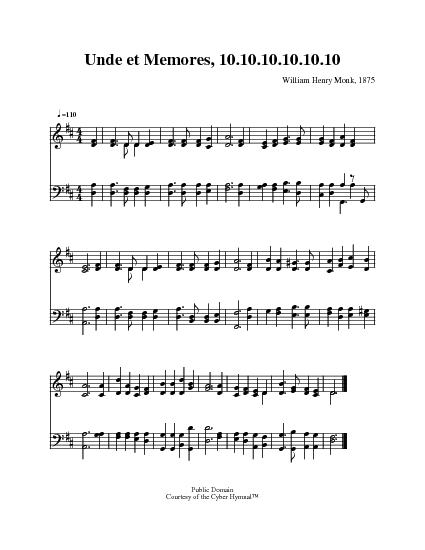- |
User Links
O holy father who in tender love

O holy father who in tender love
Author: Edward Henry Bickersteth (1889)Tune: UNDE ET MEMORES
Published in 7 hymnals
Printable scores: PDF, MusicXMLAudio files: MIDI
Representative Text
1 O Holy Father, who in tender love
Didst give Thine only Son for us to die,
The while He pleads at Thy right hand above,
We in One Spirit now with faith draw nigh,
And, as we eat this Bread and drink this Wine,
Plead His once offered Sacrifice Divine.
2 We are not worthy to be called Thy sons,
Nor gather up the fragments of Thy feast;
Yet look on us, Thy sorrowing contrite ones,
On us in Him our Advocate and Priest,
Whose robe is fringed with mercy's golden bells,
Whose breastplate fathomless compassion tells.
3 O hear us, For Thou always hearest Him;
Behold us sprinkled with His precious blood;
And from between the shadowing cherubim
Shine forth, and grant us in this heavenly food
Foretastes of coming glory, and meanwhile
A Father's blessing and a Father's smile.
4 Nor only, Father, in Thy presence here
Low at Thy footstool for ourselves we pray,
But for the loved ones to our hearts most near
At home or toiling in far lands away;
O guard them, guide them, comfort and befriend,
And keep them Thine unfaltering to the end.
5 And, Father, ere we leave Thy mercy-throne,
Bound by these sacred pledges, yet most free,
We give our hearts, and not our hearts alone,
But all we are and all we have to thee;
Glad free-will offerings all our pilgrim days,
Hereafter an eternity of praise.
Source: Methodist Hymn and Tune Book: official hymn book of the Methodist Church #261
Author: Edward Henry Bickersteth
 Bickersteth, Edward Henry, D.D., son of Edward Bickersteth, Sr. born at Islington, Jan. 1825, and educated at Trinity College, Cambridge (B.A. with honours, 1847; M.A., 1850). On taking Holy Orders in 1848, he became curate of Banningham, Norfolk, and then of Christ Church, Tunbridge Wells. His preferment to the Rectory of Hinton-Martell, in 1852, was followed by that of the Vicarage of Christ Church, Hampstead, 1855. In 1885 he became Dean of Gloucester, and the same year Bishop of Exeter. Bishop Bickersteth's works, chiefly poetical, are:—
(l) Poems, 1849; (2) Water from the Well-spring, 1852; (3) The Rock of Ages, 1858 ; (4) Commentary on the New Testament, 1864; (5) Yesterday, To-day, and For Ever, 1867; (6) The Spirit of Life, 1868;… Go to person page >
Bickersteth, Edward Henry, D.D., son of Edward Bickersteth, Sr. born at Islington, Jan. 1825, and educated at Trinity College, Cambridge (B.A. with honours, 1847; M.A., 1850). On taking Holy Orders in 1848, he became curate of Banningham, Norfolk, and then of Christ Church, Tunbridge Wells. His preferment to the Rectory of Hinton-Martell, in 1852, was followed by that of the Vicarage of Christ Church, Hampstead, 1855. In 1885 he became Dean of Gloucester, and the same year Bishop of Exeter. Bishop Bickersteth's works, chiefly poetical, are:—
(l) Poems, 1849; (2) Water from the Well-spring, 1852; (3) The Rock of Ages, 1858 ; (4) Commentary on the New Testament, 1864; (5) Yesterday, To-day, and For Ever, 1867; (6) The Spirit of Life, 1868;… Go to person page >Text Information
| First Line: | O holy father who in tender love |
| Author: | Edward Henry Bickersteth (1889) |
| Language: | English |
| Copyright: | Public Domain |
Notes
O Holy Father, Who in tender love. Bp. E. H. Bickersteth. [Holy Communion.] Printed for use in the diocese of Exeter, and dated, "January 27th, 1889." (Exeter, J. Townsend.) It is printed as a leaflet, and is accompanied by the following note by the author:—"The structure of this hymn was suggested by Canon Blight's verses, so well known in their abbreviated form, beginning, ‘And now, O Father, mindful of the love,' and the hymn was written with the echo of the most beautiful tune, ‘Unde et memores,' by W. H. Monk, to which these verses are set in Hymns Ancient and Modern, vibrating in my heart." It was included in the 1890 ed. of the Hymnal Companion with the above note in a rewritten form, and the addition that fearing some misapprehension might arise he sent a copy to Canon Bright, from whom he received an assurance that he should regard it as a "parallel hymn" to his own.
--John Julian, Dictionary of Hymnology, Appendix, Part II (1907)


 My Starred Hymns
My Starred Hymns


